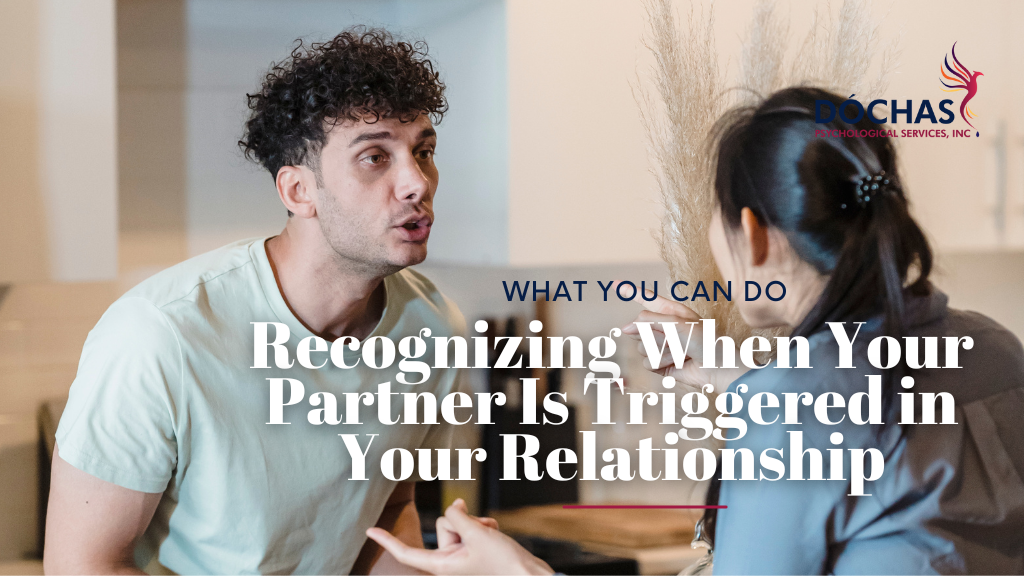Have you noticed a shift in your relationship and your partner? Perhaps the shift happened suddenly, or it has been gradual. If this shift is pulling the relationship apart, it may be due to your partner feeling triggered. This means your partner is experiencing a strong emotional reaction due to something reminding them of a past experience or unresolved issue. It’s Rachael here on the Dóchas blog today, and I recently wrote about what to do when you are feeling triggered by your partner. Today I’m going to write about what to do when you see your partner being triggered, and how to navigate this.
Recognizing Your Partner is Triggered
When our partner is triggered, it is important to respond with sensitivity and understanding, but to be able to do this we need to know they are triggered. Some signs may include:
- Sudden Mood Change: They become noticeably upset, angry, or withdrawn.
- Defensiveness and Criticism: They start to become defensive even about little things or they start to criticize you or others more than usual.
- Emotional and Exaggerated Reactions: These seem out of proportion to the situation or out of proportion to how they normally react. It may include them making extreme statements or ultimatums that are out of proportion to the situation.
- Physical Reactions: Reactions such as clenching their fists, slamming or stomping, flushed face.
- Avoidance, Silence, or Shutdown: They avoid eye contact, physical touch, or conversations about the topic that triggered them, or they become distant, disengaged, and shut down interactions completely.
- Repetitive Patterns: There are certain topics or behaviours that constantly result in strong emotional reactions.
How to Help
Now that you can recognize your partner is triggered, it is important to understand how you can help to avoid escalating the situation. First, stay calm, and give yourself and your partner space when needed to ensure neither of you is overwhelmed with emotions. Once you both are ready to talk, you can help the conversation by:
- Actively Listening: Take the time to listen attentively, without interrupting, and allow them to express their feelings and thoughts. Put your own agenda aside and pay attention.
- Asking Open-ended Questions: Encourage your partner to share more about what triggered them and why they’re feeling this way to help you develop a deeper understanding of your partner’s experience. Some helpful questions may be:
- Can you tell me about what you’re feeling right now?
- Is there something specific about this situation that’s bringing up strong emotions for you?
- Can you describe what is going through your mind right now?
- What is the most important thing you want me to understand about how you’re feeling?
- Validate Their Feelings and Empathize: Put yourself in your partner’s shoes and let them know that their feelings are valid and important. If your partner feels dismissed or like you are minimizing their feelings, it can be extremely damaging, and they won’t feel heard.
- Avoid Blame and Offer Reassurance: Focus on the issue at hand, rather than assigning blame. Using “I” statements can be very helpful for communicating without pointing fingers. Reassure your partner that you are there for them and committed to resolving the issues.
- Problem-solve Together: Work together to collaborate on solutions to help prevent similar situations in the future.
 Finding common ground or compromising can be hard to do. If you find you and your partner struggling to develop solutions when triggered or the triggers are causing significant distress, professional help may be beneficial. You can reach out to us here if you’d like a professional helping hand as you navigate this. You can reach us at 780 446 0300 or drop us a line at info@dochaspsych.com.
Finding common ground or compromising can be hard to do. If you find you and your partner struggling to develop solutions when triggered or the triggers are causing significant distress, professional help may be beneficial. You can reach out to us here if you’d like a professional helping hand as you navigate this. You can reach us at 780 446 0300 or drop us a line at info@dochaspsych.com.
About Dóchas Psychological
Dóchas Psychological Services is a well-established and trusted therapy clinic located in Spruce Grove, Alberta. At Dóchas we value the idea that everyone deserves a safe space. Through connection and education, our team works hard to build a trustworthy relationship with each of our clients. It is our goal to create a community for our clients to feel like they belong.
Disclaimer
Information provided through Dóchas Psychological Services blogs or vlogs is meant for educational purposes only. They are NOT medical or mental health advice. You can read more about our disclaimer here.










